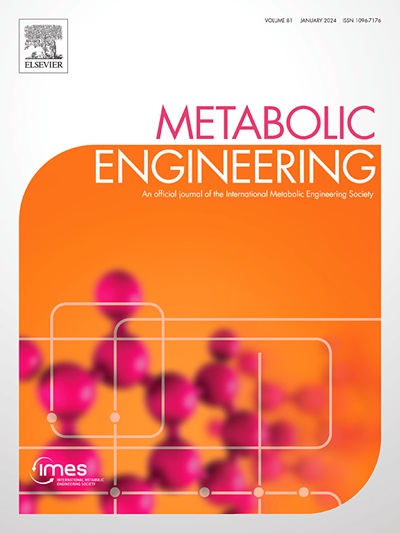Harnessing CO2 fixation and reducing power recycling for enhanced polyhydroxyalkanoates industrial bioproduction
IF 6.8
1区 生物学
Q1 BIOTECHNOLOGY & APPLIED MICROBIOLOGY
引用次数: 0
Abstract
Palm oil is an attractive feedstock for bioproduction due to its high carbon content and low cost. However, its metabolism generates excess reducing power, leading to redox imbalances and reduced metabolic efficiency in industrial fermentations. Through a model-driven approach integrating flux balance analysis, we activated the Calvin-Benson-Bassham (CBB) cycle in Cupriavidus necator to recycle surplus reducing power and restore metabolic balance in polyhydroxyalkanoate (PHA) bioproduction. Computational simulations predicted that constitutive activation of the CBB cycle enhanced CO2 fixation and accelerated biomass generation when utilizing palm oil as the carbon source. Model-guided optimization revealed that precise tuning of CBB activation strength was critical, as both insufficient and excessive activation led to metabolic inefficiencies. At the 2-liter bench-scale, CBB activation tuning resulted in biomass changes ranging from −18 % to 21 % and PHA yield changes ranging from −36 % to 25 %. Mechanistic studies demonstrated that CBB activation improves metabolic efficiency through reducing power recycling and carbon redistribution. In the 15 m3 industrial-scale fermentations, the engineered strain achieved a 20 % higher PHA yield. These results demonstrate that recycling surplus reducing power is a scalable and robust strategy for enhanced bioproduction efficiency.

利用二氧化碳固定和减少电力回收来提高聚羟基烷酸酯的工业生物生产
棕榈油因其高碳含量和低成本而成为生物生产的有吸引力的原料。然而,在工业发酵中,其代谢产生过多的还原力,导致氧化还原失衡,代谢效率降低。通过模型驱动方法整合通量平衡分析,我们激活了Cupriavidus necator的Calvin-Benson-Bassham (CBB)循环,以回收多余的还原力并恢复聚羟基烷酸酯(PHA)生物生产的代谢平衡。计算模拟预测,当利用棕榈油作为碳源时,CBB循环的本构激活增强了二氧化碳的固定并加速了生物质的产生。模型导向优化表明,CBB激活强度的精确调节至关重要,因为激活不足和过度都会导致代谢效率低下。在2升的实验规模下,CBB激活调整导致生物量变化范围为- 18%至21%,PHA产量变化范围为- 36%至25%。机制研究表明,CBB激活通过减少能量循环和碳再分配来提高代谢效率。在15立方米的工业规模发酵中,工程菌株的PHA产量提高了20%。这些结果表明,回收剩余的减少功率是提高生物生产效率的可扩展和稳健的策略。
本文章由计算机程序翻译,如有差异,请以英文原文为准。
求助全文
约1分钟内获得全文
求助全文
来源期刊

Metabolic engineering
工程技术-生物工程与应用微生物
CiteScore
15.60
自引率
6.00%
发文量
140
审稿时长
44 days
期刊介绍:
Metabolic Engineering (MBE) is a journal that focuses on publishing original research papers on the directed modulation of metabolic pathways for metabolite overproduction or the enhancement of cellular properties. It welcomes papers that describe the engineering of native pathways and the synthesis of heterologous pathways to convert microorganisms into microbial cell factories. The journal covers experimental, computational, and modeling approaches for understanding metabolic pathways and manipulating them through genetic, media, or environmental means. Effective exploration of metabolic pathways necessitates the use of molecular biology and biochemistry methods, as well as engineering techniques for modeling and data analysis. MBE serves as a platform for interdisciplinary research in fields such as biochemistry, molecular biology, applied microbiology, cellular physiology, cellular nutrition in health and disease, and biochemical engineering. The journal publishes various types of papers, including original research papers and review papers. It is indexed and abstracted in databases such as Scopus, Embase, EMBiology, Current Contents - Life Sciences and Clinical Medicine, Science Citation Index, PubMed/Medline, CAS and Biotechnology Citation Index.
 求助内容:
求助内容: 应助结果提醒方式:
应助结果提醒方式:


